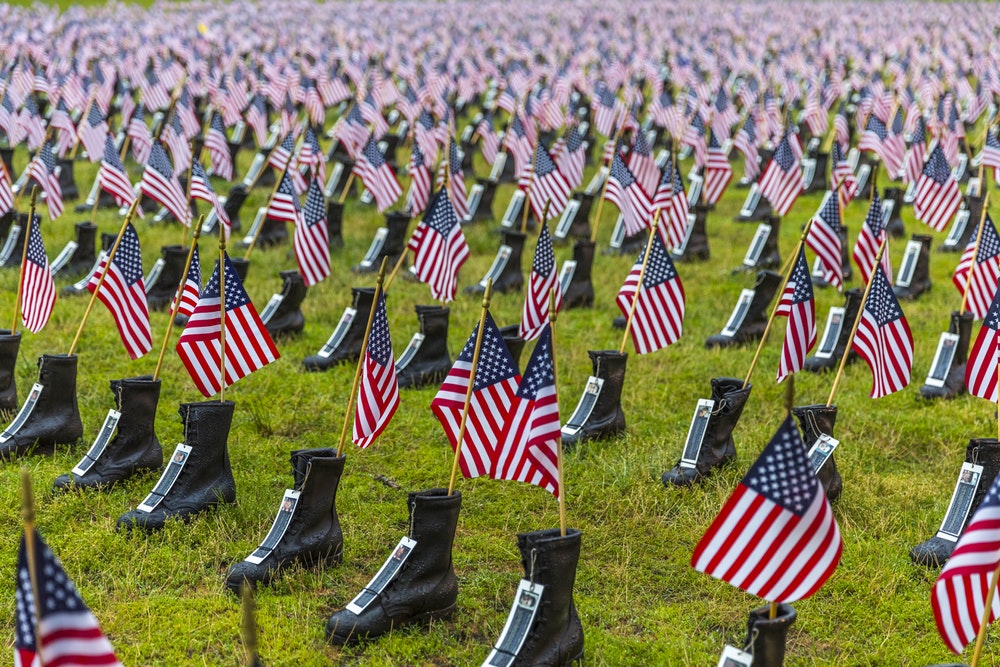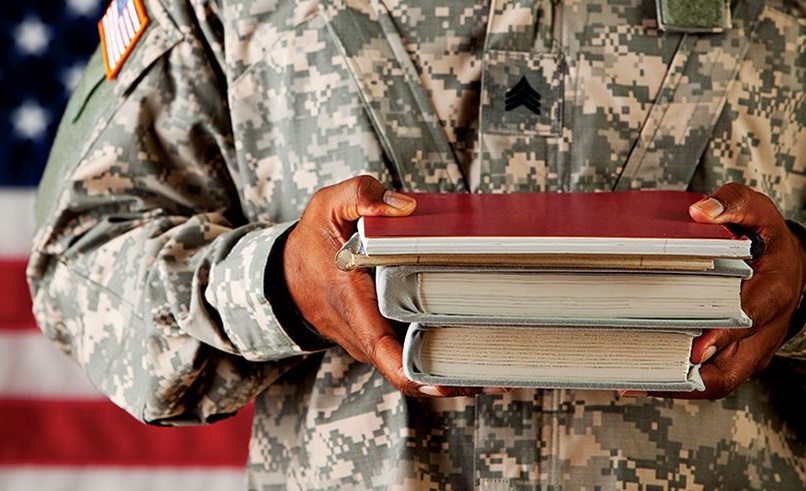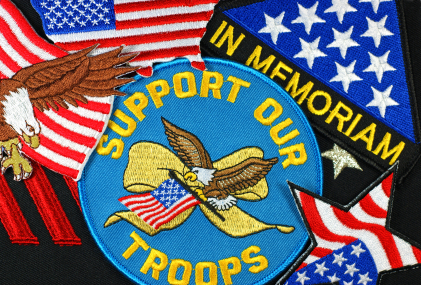Learn about the benefits for family members of fallen military
Family members of military personnel who die while serving on active duty, active duty for training (ADT), or initial duty training (IDT) may be eligible for several federal benefits, privileges or entitlements.
When a family is notified of the death of an active duty military member, they are assigned to a Casualty Assistance Representative (CAR) whose sole job is to help the family through the process. If the CAR cannot answer your questions, they will refer you to the appropriate military official or government agency, or get the answer for you.
The following shows the benefits, privileges, and entitlements for active duty military family survivors.
Monetary Benefits
Family members of military personnel who die as a direct or indirect result of wartime or peacetime service are eligible to receive several types of federal benefits. Benefits to a spouse and children are paid regardless of economic need, except in the case of a nonservice-connected death pension. Benefits for parents who might otherwise be eligible are not paid if the parents have income in excess of a certain amount each year. Your CAR, the nearest VA or Social Security office will explain the benefits to you, the amounts that can be paid, and help you complete the required claim forms.
Death Gratuity
The military “death gratuity” is a lump sum gratuitous payment made by the military to eligible beneficiaries of a member who dies on Active Duty (AD), Active Duty for Training (ADT), or Initial Duty Training (IDT), or full-time National Guard duty. Its purpose is to help the survivors in their readjustment and to aid them in meeting immediate expenses incurred. The death gratuity payment is $12,420 and is non-taxable. For those whose death is as a result of hostile actions and occurred in a designated combat operation or combat zone or while training for combat or performing hazardous duty, the payment is $100,000.
The death gratuity payment is made to survivors of the deceased in this order:
- The member’s lawful surviving spouse. Payment delivered by the CAR assigned to the reporting or assistance base, within 24 hours of the member’s death, unless the surviving spouse desires other arrangements.
- If there is no spouse, to the child or children of the member, regardless of age or marital status, in equal shares (state laws guide payment to minor children). Payment for minor children is made by the Defense Finance and Accounting Service (DFAS) within 30 days after they have received the required claim form and supporting documentation.
The death gratuity is not paid to any other person when there are no survivors as listed above. A will is not a legal designation for death gratuity since such payment is not an allowance or a debt due to the member and cannot be part of the member’s estate. The claim form required to apply for this benefit is DD Form 397, Claim Certification and Voucher for Death Gratuity Payment.
Unpaid Pay and Allowances
Upon the death of an active duty member, any pay and allowances due, but not paid to the member, are paid to the designated beneficiary named on the member’s DD Form 93, Record of Emergency Data.
Unpaid pay and allowances may include unpaid basic pay, payment for up to 60 days of accrued leave, amounts due for travel, per diem expenses, transportation of eligible family members, shipment of household goods, and unpaid installments of variable reenlistment bonuses. The decedent’s pay record is completely audited by the Defense Finance and Accounting Service, and a check for any amount due is issued to the designated beneficiary. When there is no written designation by the member, any money due is paid to the first eligible recipient in the following order:
- The member’s lawful surviving spouse.
- If there is no spouse, to the child or children of the member and descendants of deceased children, on their behalf.
- If none of the above, to the parents of the member in equal shares or the surviving parent.
- If none of the above, to the duly appointed legal representative of the member’s estate.
- If none of the above, to the person(s) determined to be entitled under the laws of the state in which the member was domiciled.
The claim form required to apply for this benefit is Standard Form 1174, Claim for Unpaid Compensation of Deceased Member of the Uniformed Services. Your CAR will help you complete the required claim form.
Family Housing
Eligible family members occupying government housing on the date the member dies may continue to occupy such housing without charge for a period of 365 days provided member’s death was in the line-of-duty. If they vacate the government housing before the 180 days are up, the Basic Allowance for Housing (BAH), is paid for the remaining unused days. If the family members are not occupying government housing, they may receive BAH or an overseas housing allowance for 180 days after the member’s death.
Your CAR will explain this entitlement to you and help you complete the required claim form.
Servicemembers’ Group Life Insurance (SGLI). The SGLI payment is $400,000 unless the member elected a lesser amount or declined coverage in writing. Monthly premium payments for the level of coverage selected by the member are automatically deducted from the member’s pay. Determination and payment of proceeds are made by the Office of Servicemembers’ Group Life Insurance under the jurisdiction of the Department of VA.
Payment of proceeds to a beneficiary is exempt from taxation. The insured member may have designated as principal or contingent beneficiary any person, firm, corporation or legal entity, including their estate, individually or as a trustee. If the member designated a trust, they indicated the name and date of the trust in the beneficiary block. If the member designated a trust through a Will, they annotated “Last Will and Testament” in the beneficiary block.
If the member chose not to designate a specific beneficiary but preferred the proceeds be paid in the order of precedence, the member selected the “By Law” designation. When the “By Law” designation is used, the proceeds are automatically paid in the following order of precedence:
- The member’s lawful surviving spouse.
- If there is no spouse, to the child or children of the member in equal shares, with the share of any deceased child to be distributed among the descendants of that child.
- If none of the above, to the parents of the member in equal shares or the surviving parent.
- If none of the above, to the duly appointed executor or administrator of the member’s estate.
- If none of the above, to other next of kin.
The claim form required to apply for this benefit is VA Form SGLV 8283, Claim for Death Benefits.
Survivor Benefit Plan (SBP)
SBP is a monthly annuity paid by the military to the surviving spouse or, in some cases, eligible children, of a member who dies on active duty. The initial annuity paid to a surviving spouse is equal to 55 percent of the retired pay to which the member would have been entitled based upon years of active service if retired on the date of death (if the member was retirement-eligible).
The annuity is reduced by the amount of the monthly DIC payment awarded and paid to the surviving spouse by the Department of VA. When the surviving spouse reaches age 62, the annuity is reduced to 35 percent. The annuity is paid until the spouse dies, but is suspended upon remarriage before age 55. The annuity to a surviving spouse may be reinstated if the subsequent marriage ends in death or divorce. The annuitant must send a certified copy of the divorce decree or death certificate to DFAS-DE to reinstate the annuity.
If a second SBP benefit resulted from the remarriage, the surviving spouse must elect which of the two SBP benefits to receive. Should the surviving spouse remarry at age 55 or older, the annuitant will continue to receive the monthly annuity. The surviving spouse must
notify DFAS-DE/FRB, 6760 E. Irvington Place, Denver CO 80279-6000, of any changes in marital status. Detailed information will be provided by your CAR and the DFAS-DE Center.
Reserve Component Survivor Benefit Plan (RCSBP)
It is a monthly annuity paid by the military to the surviving spouse or, in some cases, eligible children, of a Reserve Component member who dies and has completed the satisfactory years of service that qualified the member for retired pay at age 60. The member must have made an election within 90 days of notification of eligibility to participate in the program. Members of an Active Guard/Reserve 10211 (officer) or 12310 (enlisted) tour, are eligible to participate in the plan. Coverage is not automatic unless the member dies before the 90 day period established by law.
The initial annuity paid to a surviving spouse is equal to 55 percent of the retired pay to which the member would have been entitled at age 60, reduced by the Reserve Portion Cost.
SBP and RCSBP Factors
Should the surviving spouse remarry before age 55, the annuity is paid in equal shares to eligible children under age 18, or under age 22 if a full-time student, unless handicapped. The coverage stops when there are no eligible children. A dependent child may be an adopted child, stepchild, grandchild, foster child, or recognized a natural child who lived with the member in a regular parent-child relationship. A child disabled before age 18, or before age 22 if a full-time student when the disability occurred, is an eligible beneficiary so long as the disability exists and the child remains incapable of self-support.
DFAS-DE reinstates a child’s annuity when a child between the ages of 18 and 22 reenters school on a full-time basis, or a disabling condition recurs making the child incapable of self-support. Marriage at any age terminates a child’s eligibility. The monthly annuity for children is 55 percent and is not reduced by DIC or when a disabled child attains age 62. Marriage at any age terminates a child’s eligibility.
Survivor annuities are taxable income. You will receive a tax statement from the Defense Finance and Accounting Service at the end of the year. The statement will show the full amount of the annuity payments you received and the total amount of tax withheld during the year.
Unless you elect otherwise, the amount of federal income tax withheld (FITW) will be as if you were a married individual claiming three exemptions. If you want your FITW changed at a later date, you must complete a new TD-Form W-4P, Withholding Certificate for Pension or Annuity Payments, showing the changes, and mail it to DFAS-DE/FRB, 6760 E. Irvington Place, Denver CO 80279-6000.
The Defense Finance and Accounting Service withhold a 30 percent Federal income tax on annuities paid to nonresident aliens unless the beneficiary resides in a country that has a tax treaty with the United States specifying a different withholding rate. Address questions to the Internal Revenue Service, Assistant Commissioner (International), ATTN: IN:C:TPS, 950 L’Enfant Plaza South, SW, Washington DC 20024-2123, or contact the nearest American Embassy.
Annuities may be subject to Federal estate taxes. Beneficiaries should address tax questions to a legal assistance officer or the nearest Internal Revenue Service office.
A certificate of continued eligibility form will be sent to you each year prior to your birthday. Complete and return the form promptly so the Defense Finance and Accounting Service can continue your annuity without interruption. Read the instructions on the form and make sure you have completed it correctly. Sign and date the form and send it to DFAS-DE/FRB, 6760 E. Irvington Place, Denver CO 80279-6000.
Dependency and Indemnity Compensation (DIC) Offset
The Defense Finance and Accounting Service reduces a surviving spouse’s annuity by the amount of DIC the VA awards and pays the surviving spouse. The SBP annuity is not reduced by the amount of a child’s DIC entitlement.
The claim forms required to apply for this benefit are DD Form 2656-4 (this form is not available electronically), TD-Form W-4P, Withholding Certificate for Pension or Annuity Payments, (available from the Post Office or IRS), and SF 1199A, Direct Deposit Sign-Up Form. The Defense Finance and Accounting Service may require additional documents to establish an annuity (i.e., Representative Payee documentation; school certification; physician’s statement for a disabled child over age 18).
Dependency and Indemnity Compensation (DIC)
The DIC payments may be authorized for surviving spouses who have not remarried, unmarried children under age 18, disabled children, children between the age of 18 and 23 if attending a VA-approved school, and low-income parents of servicemembers who die from:
- A disease or injury incurred or aggravated while on active duty or active duty for training.
- An injury incurred or aggravated in line of duty while on inactive duty training.
- A disability compensable by the Veterans’ Affairs.
DIC paid to a surviving spouse is not based on the member’s military pay grade. The amount paid for a spouse with one or more children of the deceased is increased for each child. The amount of the DIC payment for parents vary according to the number of parents, the amount of their individual or combined total annual income, and whether they live together or if remarried, living with a spouse. The surviving spouse and parents who receive DIC may be granted a special allowance for aid and attendance if a patient is in a nursing home, disabled, or blind and needs or requires the regular aid and attendance of another person.
If they are not so disabled as to require the regular aid and attendance of another person but who, due to disability, are permanently housebound, they may be granted additional special allowances. DIC payments to a surviving spouse are payable for life, as long as the spouse does not remarry. Should the surviving spouse remarry, payments are terminated for life? Your CAR or the nearest VA office will explain the benefit to you, the amounts that can be paid, and help you complete the required claim forms.
The claim form when applying for this benefit is VA Form 21-534, Application for Dependency and Indemnity Compensation or Death Pension Accrued Benefits by Surviving Spouse or Child, or VA Form 21-535, Application for Dependency and Indemnity Compensation by Parent(s).
Denial of Claim for DIC
If the VA denies your claim for DIC benefits, you may file an appeal with the Board of Veterans’ Appeals. The appeal must be filed within one year from the date of the notification of a VA decision to file an appeal. The first step in the appeal process is for you to file a written notice of disagreement with the VA regional office that made the decision. It is a written statement that you disagree with the VA’s decision. Following receipt of the written notice, the VA will furnish you a “Statement of the Case” describing what facts, laws, and regulations were used in deciding the case.
To complete the request for appeal, you must file a “Substantive Appeal” within 60 days of the mailing of the Statement of Case, or within one year from the date, the VA mailed its decision, whichever period ends later. Your CAR or the nearest VA office will help you file a written notice of disagreement with the VARO (Veteran Affairs Regional Office) that made the decision.
Nonservice-Connected Death Pension
If the VARO determines that you are not eligible for DIC, you may be eligible to apply for a nonservice-connected death pension. Surviving spouses and unmarried children under age 18, age 23 if attending a VA-approved school, of deceased members with wartime service may be eligible for this pension if they meet income limitations prescribed by law. Qualifying children who become incapable of self-support because of a disability before age 18 may be eligible for a pension as long as the condition exists unless the child marries or the child’s income exceeds the income limit.
The rate of the pension depends on the amount of income the surviving spouse or child receives from other sources. A pension is not payable to those whose estates are so large that it is reasonable to assume the estate will maintain them financially. Eligible survivors should make application through the local VA office. The VA will determine your eligibility.
Montgomery GI Bill Death Benefit
The VA will pay a special Montgomery GI Bill death benefit to a designated survivor in the event of the service-connected death of an individual while on active duty. The deceased must either have been entitled to educational assistance under the Montgomery GI Bill program, or a participant in the program who would have been so entitled but for the high school diploma or length of service requirement. The amount paid will be equal to the deceased member’s actual military pay reduction less any educational benefits paid.
If you are eligible to receive the death benefit, submit a letter, along with proof of relationship and a copy of the DD Form 1300, Report of Casualty, to the appropriate VA Regional Office. The death benefit is made in “by-law” fashion to the spouse, children, and parents, and will not be paid to anyone else in the “by-law” chain. Your CAR or the nearest VA office can help you apply for a refund of contributions.
Social Security Payments
Social Security monthly benefits are paid to a spouse or a divorced spouse, age 60 or over; a spouse or divorced spouse regardless of age with children of the decedent under age 16 or disabled in their care and meeting social security requirements.
A divorced spouse must have been married to the service member at least 10 years. Monthly payments are also paid to children until age 18 or 19 if a full-time student at a primary or secondary school, or age 18 or older and disabled before age 18. Spouses waiting until age 65 to apply for Social Security receive maximum benefits. However, they can receive reduced Social Security payments between ages 60 and 65.
Dependent parents are eligible for benefits at age 62 if they were more than 50 percent dependent on the deceased service member for their support. The amount paid can only be determined by the Social Security Administration, which has a record of the wages earned by the member during the period of both military and civilian employment under the Social Security Program. To receive this benefit, eligible survivors should make application to the nearest Social Security office. They will explain the benefit, determine your eligibility, the amounts that can be paid, and help you complete the required claim forms.
You should apply early, as the law generally permits retroactive payments of 12 months.
Social Security Lump Sum Death Payment
The Social Security Administration pays a lump-sum death payment, up to $255, to the surviving spouse living with the member at the time of death. Separation because of military service, is considered living together. If there is no surviving spouse, it is paid to the oldest child who was eligible for or entitled to Social Security benefits for the month of death, based upon the deceased member’s earnings. No other survivors are entitled to this benefit. This benefit is paid regardless if burial, funeral, or memorial benefits were paid by the military.
To receive this benefit, eligible survivors must make application to the nearest Social Security office. They will explain the benefit, determine your eligibility, the amount that can be paid, and help you complete the required claim forms.












